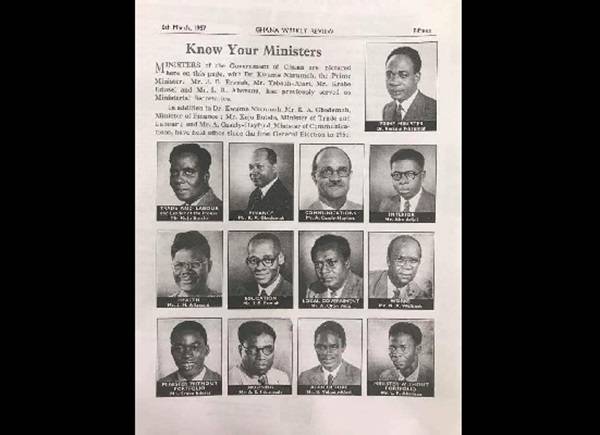Upon establishing his government as the inaugural president and prime minister, Osagyefo Dr. Kwame Nkrumah meticulously handpicked a select group of individuals to assist him in managing the affairs of the newly independent nation of Ghana. These appointments were crucial in shaping the trajectory of the nation's governance and development.
From the outset, key figures such as Dr. Kwame Nkrumah himself, Mr. K. A. Gbedemah, Mr. Kojo Botsio, and Mr. A. Casely-Hayford took up pivotal roles, having been elected since the nation's first General Election in 1951. Their collective leadership and expertise laid the foundation for Ghana's early post-independence governance.
The following is a detailed compilation of the first twelve individuals who undertook ministerial roles in the newly independent Ghana in 1957, each contributing uniquely to the nation's progress:
1. Kojo Botsio: Trade and Labor, Leader of the House
Kojo Botsio, a distinguished Ghanaian diplomat and politician, initially served as Ghana's first Minister of Education and Social Welfare in 1951. His subsequent roles included twice holding the position of Minister for Foreign Affairs in Kwame Nkrumah's government, demonstrating his significant contributions to the ruling Convention People's Party (CPP).
2. Komla Agbeli Gbedemah: Finance
Known affectionately as "Afro Gbede," Komla Agbeli Gbedemah hailed from the Volta Region and made substantial contributions as Minister for Finance in the Kwame Nkrumah government from 1954 to 1961. His expertise and leadership in the financial sector were instrumental in steering the nation through crucial economic challenges.
3. Archibald “Archie” Casely-Hayford: Communications
A British-trained Ghanaian barrister and politician, Archibald Casely-Hayford joined the Convention People's Party in 1951. His tenure as Minister of Agriculture and Natural Resources underscored his commitment to Ghana's development, particularly in vital sectors crucial for the nation's growth.
4. Ebenezer Ako-Adjei: Interior
Dr. Ebenezer Ako-Adjei, a statesman, politician, lawyer, and journalist, played a foundational role in Ghana's struggle for independence. As a founding member of the United Gold Coast Convention (UGCC) and one of The Big Six, his appointment as Minister of Interior signified his dedication to national security and stability. 5. Joseph Henry Allasani: Health
Joseph Henry Allasani, a dedicated Ghanaian teacher and politician, assumed the crucial role of the first Health Minister during Ghana's first republic. His leadership in the health sector aimed to enhance the well-being of Ghana's citizens, laying the groundwork for a robust healthcare system.
6. John Bogolo Erzuah: Education
John Bogolo Erzuah, a distinguished diplomat, politician, and educator, served as a minister of state and represented Ghana in various foreign missions. His commitment to education underscored the government's focus on fostering intellectual development and ensuring access to quality education for all Ghanaians.
7. Kofi Asante Ofori-Atta: Local Government
Kofi Asante Ofori-Atta's tenure as Minister for Local Government in Kwame Nkrumah's CPP government exemplified his dedication to grassroots governance and community development. His subsequent role as Minister for Justice and Speaker of Parliament further solidified his impact on Ghana's legal and legislative landscape.
8. Nathaniel Azarco Welbeck: Works
Nathaniel Azarco Welbeck, a founding member of the Convention People's Party, served as a minister of state in the first republic. His contributions to infrastructure development and public works were instrumental in laying the foundation for Ghana's economic progress and modernization.
9. Krobo Edusei: Minister Without Portfolio
Krobo Edusei, a prominent Ashanti activist and key figure in the Ghanaian independence movement, played a pivotal role in Kwame Nkrumah's government. His appointment as Minister Without Portfolio reflected his influence and dedication to advancing Ghana's socio-political agenda.
10. Ashford Emmanuel Inkumsah: Housing
Ashford Emmanuel Inkumsah, a distinguished chemist and politician, held various ministerial portfolios during the First Republic. His leadership in housing underscored the government's commitment to providing affordable and sustainable housing solutions for Ghana's growing population.
11. Kwame Boahene Yeboah-Afari: Agriculture
Kwame Boahene Yeboah-Afari, an esteemed educator and politician, served as Ghana's first Minister for Agriculture and Regional Minister for the Brong Ahafo Region. His efforts aimed to modernize agricultural practices and promote food security, crucial for Ghana's economic development.
12. Lawrence Rosario Abavana: Minister Without Portfolio
- Lawrence Rosario Abavana, a dedicated politician and teacher, held various ministerial portfolios in the First Republic. His membership in the CPP and subsequent role in the Council of State underscored his enduring commitment to Ghana's governance and progress.
The collective contributions of these individuals, alongside Dr. Kwame Nkrumah and other key figures, laid the groundwork for Ghana's post-independence governance and development, shaping the nation's trajectory for years to come. Their dedication, expertise, and leadership continue to inspire generations of Ghanaians striving for progress and prosperity.




No comments yet
Be the first to share your thoughts!